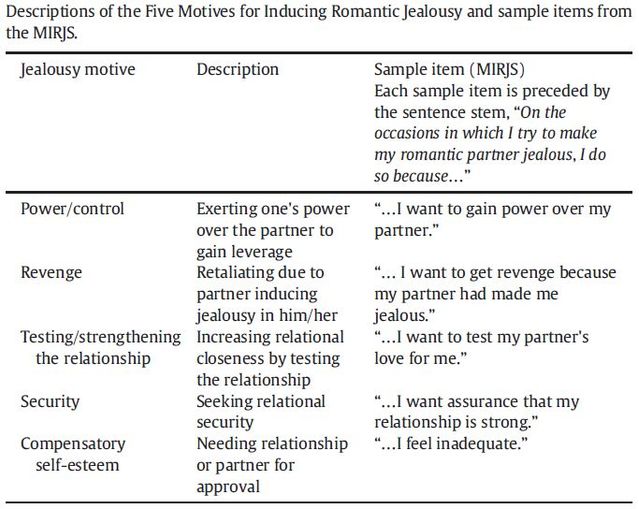Jealousy
Do Narcissists Make Their Partners Jealous on Purpose?
New research says some may, and explains why.
Posted April 3, 2017 Reviewed by Davia Sills

Anyone who has spent significant time dating a narcissistic person knows firsthand that such partners often provoke jealousy by talking about wanting to date other people, commenting on how attractive someone else is (e.g., while out on a date), and discussing the shortcomings of their current partner compared to others.
Considering that narcissistic people are typically thought to be insecure deep down, on first blush it doesn't make sense that they would do things which would threaten their romantic relationships. Researchers (Tortoriello et al. 2017) set out to learn why.
They note there are two sub-types of narcissism—grandiose and vulnerable. Grandiose narcissists appear confident and outgoing, seemingly devoid of social anxiety, and read immediately to others as "narcissistic." Vulnerable narcissists, on the other hand, come across as shy, socially anxious, and quiet. After a while, however, they tend to get haughty, making others feel worse, possibly to shore up low self-esteem. All these maneuvers take a toll on relationships. Tortoriello and colleagues report that regardless, both grandiose and vulnerable narcissists regularly do things which undermine their relationships.
The examples are familiar: Narcissistic people may act distant and uninterested, even when they are in a committed relationship; they may form "platonic" relationships with attractive people and act like it shouldn't bother their partners; they may talk about why they should dump whomever they're seeing to be with someone else, highlighting their current partner's shortcomings; and they often brazenly flirt and brush it off. They often do things which make their partners insecure and jealous—and then blame them for overreacting or having "issues."
Seeking to work out what causes narcissists to make others jealous, the authors used the "five motives for inducing romantic jealousy" and tested for them by surveying narcissists with a rating tool (the Motives for Inducing Romantic Jealousy Scale, or MIRJS), after assaying for narcissistic traits.
Here are the five motives identified from prior research (adapted from Tortoriello et al.):

In addition to the MIRJS, participants (237 undergraduate students) also completed various other measures from the Narcissistic Personality Inventory, the Pathological Narcissism Inventory, the Mach-IV (as in "Machiavellianism"), and the Rosenberg Self-Esteem Scale, in addition to completing the Romantic Jealousy-Induction Scale. This allowed researchers to measure correlations among various aspects of narcissism with motives to make romantic partners jealous.
The researchers' findings were telling: While grandiose narcissists make romantic partners feel jealous on purpose to achieve various planned-out goals, vulnerable narcissists are motivated by power/control motives and insecurity. Interestingly, the grandiose narcissists showed a relatively lower tendency to use jealousy to bolster low self-esteem. Generally speaking, grandiose narcissists were more likely to use jealousy, and other tactics, in a deliberate way to achieve relationship goals (e.g., to test or strengthen the relationship), while vulnerable narcissists were more likely to behave in unplanned, emotionally-driven ways out of insecurity.
The researchers go on to note that grandiose narcissism bears similarity with psychopathy, not surprising given the characteristic lack of empathy. While grandiose narcissists are inclined to seek revenge, in romantic relationships they tend not to induce jealousy for this purpose. Rather, revenge may come up in the form of violence or emotional abuse. For vulnerable narcissists, it's more about insecurity leading to defensive and offensive responses out of emotional distress.
More research is necessary to see if these findings go beyond correlation. It would be useful to test whether there are causal connections between inducing revenge and various motives, which would require a more sophisticated experimental design to simulate different relationship situations, with different options for what to do, including inducing revenge among others, and see which approach different types of narcissists tend to use in response.
If you happen to be dating someone who is high in narcissistic traits and plan to remain in the relationship, and you are trying to figure out what makes them tick, first sort out whether they are grandiose or vulnerable. This will clue you into whether they are trying to fuel your jealousy on purpose to achieve their goals, or whether they are acting from emotions they may not be fully aware of. Armed with this information, you may be better able to navigate it when jealousy rears its ugly head.
Please send questions, topics or themes you'd like me to try and address in future blogs, via my PT bio page.
References
Tortiello GK, Hart W, Richardson K, Tullett AM. (2017). Do narcissists try to make romantic partners jealous on purpose? An examination of motives for deliberate jealousy-induction among subtypes of narcissism. Personality and Individual Differences, March, 114, 10-15.




